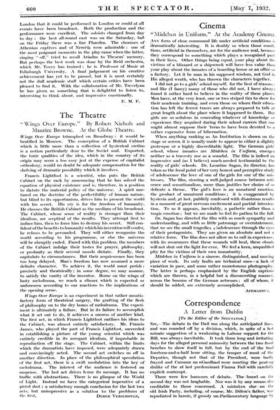Cinema
"Madchen in Uniform." At the Academy Cinema.
/ors( form of close communal life under artificial conditions is draMatically interesting. It is doubly so when those condi_ tions; artificial in themselves, arc for the audience real, because they correspond to something which plays a recognized part in their lives. Other things being equal, your play abOut the victims of a blizzard or a shipwreck will have less value than your play about the inmates of a boarding house or an OM& or a factory. Let it be man in his supposed wisdom, not pia hi His alleged wrath, who has thrown the charactera together. I did not go to a girls' school myself, for the best of reasons ; and like (I fancy) many of those who did not, I have always found it rather hard to believe in the reality of these places, Men have, at the very least, one or two striped ties to show for their academic training, and even those on whom their educa- tion has left the fewest traces are always prepared to talk at great length about the place where it happened to them. But girls are so sedulous in concealing whatever of knowledge or experience they acquired during their school careers that one might almost suppose their 'teens to have been devoted to a rather expensive form of hibernation.
When anything ranking as An Institution is'shown on the stage or screen, it is usually made to appear in either a slightly grotesque or a- highly discreditable light: The German girls' school, whose inmates are Matichen in Uniform, emerges neither as a travesty nor as a scandal. The film is indeed an impressive and (as I believe) much needed testimonial to the reality of girls' schools. Dr. Leontine Sagan, its-director, has taken as the focal point of her very honest and perceptive study of adolescence the love of One of the girls for one 'of the mis- tresses: The film, steering a well-judged course between reti- cence and sensationalism, more than justifies her choice of so delicate a theme. The girl's love is an unnatural emotion, the product of unnatural conditions ; it is exaggerated by hysteria and, at last, publicly confessed with disastrous results in a moment of great nervous excitement and partial intoxica- tion. To us it appears, inevitably, a pathetic rather than a tragic emotion ; but we are made to feel its pathos to the full.
Dr. Sagan has directed the film with so mud' sympathy and understanding, and with so little patronage or overstatement, that we see the small tragedies efadoleseence through the eyes of their protagonists. They are given an absolute and not a relative force. The film does not allow us to call inexperience with its assurances that these wounds will heal, these cloud, will not shut out the light for ever. We feel a keen, unqualified pity for the victims of their own immaturity. • 211itrichen in Uniform is a sincere, distinguished, and moving piece of work. Its only faults are technical ones-L-a lack of variation in pace, and sonic rather monotonous photography. The latter is perhaps emphasized by the English captions which are thrown, in a helpful but a disconcerting manner, across the bosoms of the German actresses ; all of whom, it should be added, are extremely accomplished.
APEMANTE






































 Previous page
Previous page